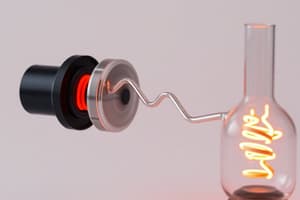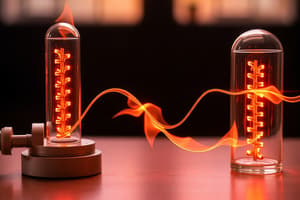Podcast
Questions and Answers
What does the First Law of Thermodynamics state?
What does the First Law of Thermodynamics state?
- Energy cannot be created or destroyed, only transformed. (correct)
- Energy can be created and destroyed.
- Temperature is defined by thermal equilibrium.
- The entropy of a system always decreases.
The Second Law of Thermodynamics states that heat can flow spontaneously from a colder body to a hotter body.
The Second Law of Thermodynamics states that heat can flow spontaneously from a colder body to a hotter body.
False (B)
What is the significance of the Zeroth Law of Thermodynamics?
What is the significance of the Zeroth Law of Thermodynamics?
It establishes the concept of temperature.
In thermodynamics, __________ is defined as the total heat content of a system.
In thermodynamics, __________ is defined as the total heat content of a system.
Match the following thermodynamic processes with their descriptions:
Match the following thermodynamic processes with their descriptions:
What is represented by the equation η = (W_out / Q_in) for Carnot engines?
What is represented by the equation η = (W_out / Q_in) for Carnot engines?
The entropy of a perfect crystal approaches zero as temperature approaches absolute zero.
The entropy of a perfect crystal approaches zero as temperature approaches absolute zero.
What characterizes the Otto Cycle in thermodynamics?
What characterizes the Otto Cycle in thermodynamics?
The equation for the Ideal Gas Law is __________.
The equation for the Ideal Gas Law is __________.
Which of the following processes does NOT involve heat exchange?
Which of the following processes does NOT involve heat exchange?
Flashcards are hidden until you start studying
Study Notes
Thermodynamics
-
Definition: Study of heat, energy, and work, and how they interact in physical systems.
-
Laws of Thermodynamics:
- Zeroth Law: If two systems are in thermal equilibrium with a third system, they are in thermal equilibrium with each other. This establishes the concept of temperature.
- First Law: Energy cannot be created or destroyed, only transformed. Mathematically: ΔU = Q - W (where U is internal energy, Q is heat added, W is work done by the system).
- Second Law: In any energy transfer, entropy (disorder) of an isolated system always increases. Heat cannot spontaneously flow from a colder body to a hotter body.
- Third Law: As temperature approaches absolute zero, the entropy of a perfect crystal approaches zero.
-
Key Concepts:
- Heat: Energy transferred due to temperature difference.
- Work: Energy transfer when a force acts over a distance.
- Internal Energy (U): Total energy contained within a system, including kinetic and potential energies of particles.
- Entropy (S): Measure of disorder or randomness in a system.
- Enthalpy (H): Total heat content of a system, defined as H = U + PV (P = pressure, V = volume).
-
Processes:
- Isothermal Process: Temperature remains constant (ΔT = 0).
- Adiabatic Process: No heat exchange with surroundings (Q = 0).
- Isobaric Process: Pressure remains constant (ΔP = 0).
- Isochoric Process: Volume remains constant (ΔV = 0).
-
Thermodynamic Cycles:
- Carnot Cycle: Idealized cycle that establishes the maximum efficiency of heat engines.
- Otto Cycle: Used in gasoline engines, involves isochoric and isobaric processes.
- Diesel Cycle: Used in diesel engines, characterized by isentropic compression and constant-pressure heat addition.
-
Applications:
- Heat engines: Convert thermal energy into mechanical work (e.g., steam engines, internal combustion engines).
- Refrigerators and heat pumps: Transfer heat from a cooler to a warmer area, utilizing work input.
- Phase transitions: Analyze changes in state, such as melting, boiling, and sublimation.
-
Key Equations:
- Ideal Gas Law: PV = nRT (P = pressure, V = volume, n = number of moles, R = universal gas constant, T = temperature).
- Efficiency of a Heat Engine: η = (W_out / Q_in) = 1 - (T_c / T_h) for Carnot engines (T_c = cold reservoir temperature, T_h = hot reservoir temperature).
-
Important Terms:
- Thermal Equilibrium: State where all parts of a system are at the same temperature.
- Heat Capacity (C): Amount of heat needed to change the temperature of a substance by one degree.
- Specific Heat (c): Heat capacity per unit mass of a material.
Use these notes as a quick reference for understanding the fundamental aspects of thermodynamics in physics.
Thermodynamics Overview
- Study of interactions between heat, energy, and work in physical systems.
Laws of Thermodynamics
-
Zeroth Law: Establishes thermal equilibrium; if two systems share a third system in thermal equilibrium, they also share it with each other, defining temperature.
-
First Law: Energy conservation principle; energy cannot be created or destroyed, only transformed. Equation: ΔU = Q - W (ΔU = change in internal energy, Q = heat added, W = work done).
-
Second Law: States that in energy transfers, the entropy (disorder) of an isolated system increases. Heat cannot naturally flow from a cooler to a warmer body.
-
Third Law: As temperature nears absolute zero, the entropy of a perfect crystal approaches zero.
Key Concepts
-
Heat: Energy transferred due to a temperature difference.
-
Work: Energy transferred when a force moves an object over a distance.
-
Internal Energy (U): Total energy in a system, combining kinetic and potential energy of particles.
-
Entropy (S): Quantifies disorder or randomness in a system.
-
Enthalpy (H): Total heat content; calculated as H = U + PV (P = pressure, V = volume).
Thermodynamic Processes
-
Isothermal Process: Temperature remains constant (ΔT = 0).
-
Adiabatic Process: No heat exchange with the environment (Q = 0).
-
Isobaric Process: Pressure remains constant (ΔP = 0).
-
Isochoric Process: Volume remains constant (ΔV = 0).
Thermodynamic Cycles
-
Carnot Cycle: Ideal cycle that maximizes heat engine efficiency.
-
Otto Cycle: Found in gasoline engines; combines isochoric and isobaric processes.
-
Diesel Cycle: Used in diesel engines; features isentropic compression and constant-pressure heat addition.
Applications
-
Heat Engines: Convert thermal energy into mechanical work; examples include steam and internal combustion engines.
-
Refrigerators and Heat Pumps: Move heat from cooler to warmer areas with work input.
-
Phase Transitions: Study of state changes like melting, boiling, and sublimation.
Key Equations
-
Ideal Gas Law: PV = nRT (P = pressure, V = volume, n = moles, R = universal gas constant, T = temperature).
-
Heat Engine Efficiency: η = (W_out / Q_in) = 1 - (T_c / T_h) for Carnot engines, where T_c is cold reservoir temperature and T_h is hot reservoir temperature.
Important Terms
-
Thermal Equilibrium: Condition where all parts of a system are at the same temperature.
-
Heat Capacity (C): The amount of heat needed to change a substance's temperature by one degree.
-
Specific Heat (c): Heat capacity per unit mass of material, providing insight into how substances respond to heat changes.
Studying That Suits You
Use AI to generate personalized quizzes and flashcards to suit your learning preferences.




